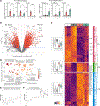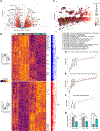Disrupting the RNA polymerase II transcription cycle through CDK7 inhibition ameliorates inflammatory arthritis
- PMID: 39565872
- PMCID: PMC11756345
- DOI: 10.1126/scitranslmed.adq5091
Disrupting the RNA polymerase II transcription cycle through CDK7 inhibition ameliorates inflammatory arthritis
Abstract
Macrophages are key drivers of inflammation and tissue damage in autoimmune diseases including rheumatoid arthritis. The rate-limiting step for transcription of more than 70% of inducible genes in macrophages is RNA polymerase II (Pol II) promoter-proximal pause release; however, the specific role of Pol II early elongation control in inflammation, and whether it can be modulated therapeutically, is unknown. Genetic ablation of a pause-stabilizing negative elongation factor (NELF) in macrophages did not affect baseline Pol II occupancy but enhanced the transcriptional response of paused anti-inflammatory genes to lipopolysaccharide followed by secondary attenuation of inflammatory signaling in vitro and in the K/BxN serum transfer mouse model of arthritis. To pharmacologically disrupt the Pol II transcription cycle, we used two covalent inhibitors of the transcription factor II H-associated cyclin-dependent kinase 7 (CDK7), THZ1 and YKL-5-124. Both reduced Pol II pausing in murine and human macrophages, broadly suppressed induction of pro- but not anti-inflammatory genes, and rapidly reversed preestablished inflammatory macrophage polarization. In mice, CDK7 inhibition ameliorated both acute and chronic progressive inflammatory arthritis. Lastly, CDK7 inhibition down-regulated a pathogenic gene expression signature in synovial explants from patients with rheumatoid arthritis. We propose that interfering with Pol II early elongation by targeting CDK7 represents a therapeutic opportunity for rheumatoid arthritis and other inflammatory diseases.
Conflict of interest statement
Figures






References
Publication types
MeSH terms
Substances
Grants and funding
LinkOut - more resources
Full Text Sources
Molecular Biology Databases

